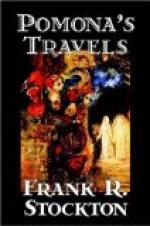Sometimes we passed houses and little settlements, but, for the most part, the country was as wild as undiscovered lands, which, being that to me, I felt happier, I am sure, than Columbus did when he first sighted floating weeds. Jone was a good deal wound up too, for he had never seen anything so beautiful as all this. We had our luncheon at a little inn, where the bread was so good that for a time I forgot the scenery, and then we went on, passing through the Forest of Dean, lonely and solemn, with great oak and beech trees, and Robin Hood and his merry men watching us from behind the bushes for all we knew. Whenever the river twists itself around, as if to show us a new view, old Samivel would say: “Now isn’t that the prettiest thing you’ve seen yet?” and he got prouder and prouder of his river every mile he rowed.
At one place he stopped and rested on his oars. “Now, then,” said he, twinkling up his face as if he was really David Llewellyn showing us a fish with its eyes bulged out with sticks to make it look fresh, “as we are out on a kind of a lark, suppose we try a bit of a hecho,” and then he turned to a rocky valley on his left, and in a voice like the man at the station calling out the trains he yelled, “Hello there, sir! What are you doing there, sir? Come out of that!” And when the words came back as if they had been balls batted against a wall, he turned and looked at us as proud and grinny as if the rocks had been his own baby saying “papa” and “mamma” for visitors.
Not long after this we came to a place where there was a wide field on one side, and a little way off we could see the top of a house among the trees. A hedge came across the field to the river, and near the bank was a big gate, and on this gate sat two young women, and down on the ground on the side of the hedge nearest to us was another young woman, and not far from her was three black hogs, two of them pointing their noses at her and grunting, and the other was grunting around a place where those young women had been making sketches and drawings, and punching his nose into the easels and portfolios on the ground. The young woman on the grass was striking at the hogs with a stick and trying to make them go away, which they wouldn’t do; and just as we came near she dropped the stick and ran, and climbed up on the gate beside the others, after which all the hogs went to rooting among the drawing things.
As soon as Samivel saw what was going on he stopped his boat, and shouted to the hogs a great deal louder than he had shouted to the echo, but they didn’t mind any more than they had minded the girl with the stick. “Can’t we stop the boat,” I said, “and get out and drive off those hogs? They will eat up all the papers and sketches.”
“Just put me ashore,” said Jone, “and I’ll clear them out in no time;” and old Samivel rowed the boat close up to the bank.
But when Jone got suddenly up on his feet there was such a twitch across his face that I said to him, “Now just you sit down. If you go ashore to drive off those hogs you’ll jump about so that you’ll bring on such a rheumatism you can’t sleep.”




